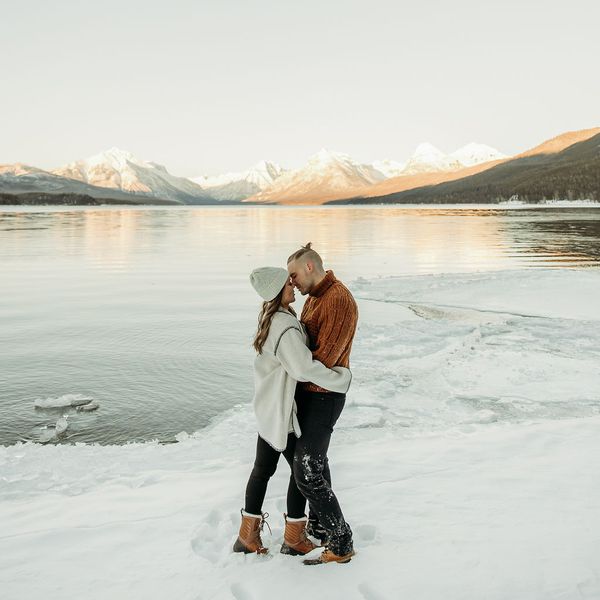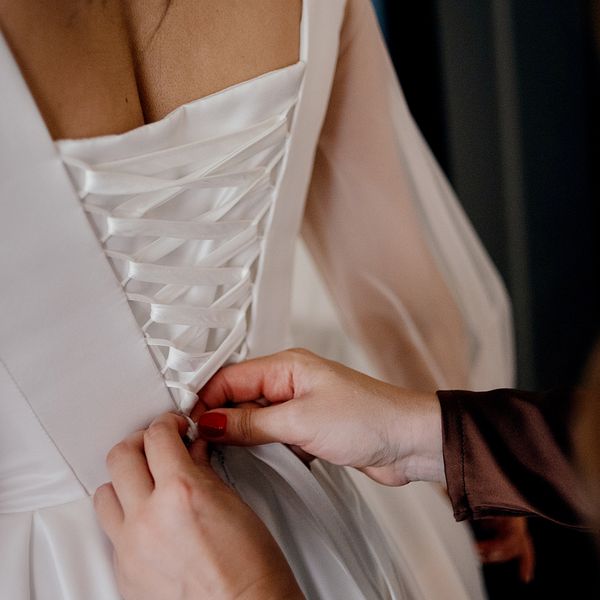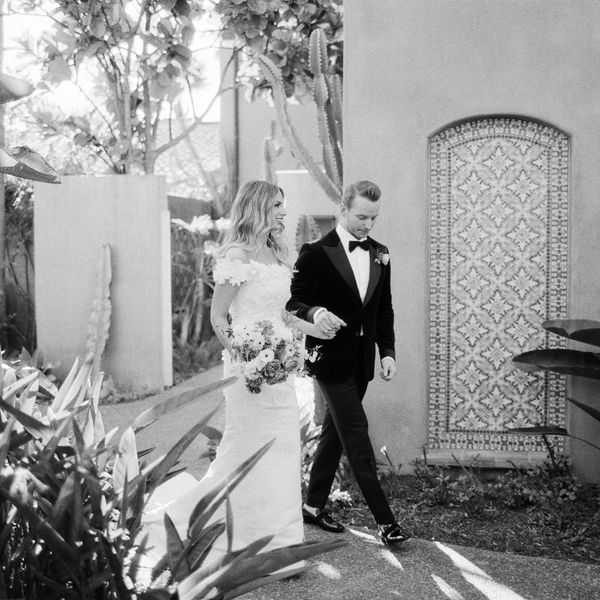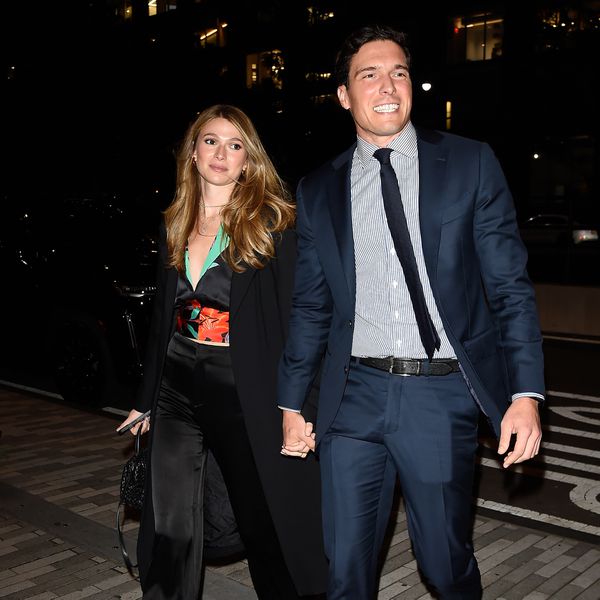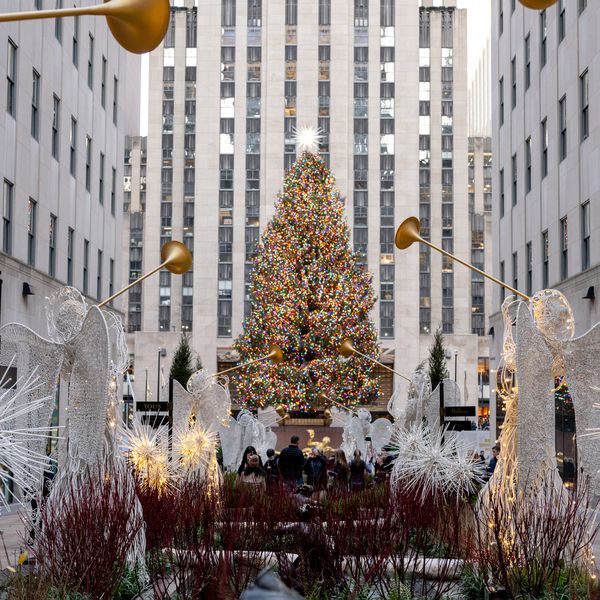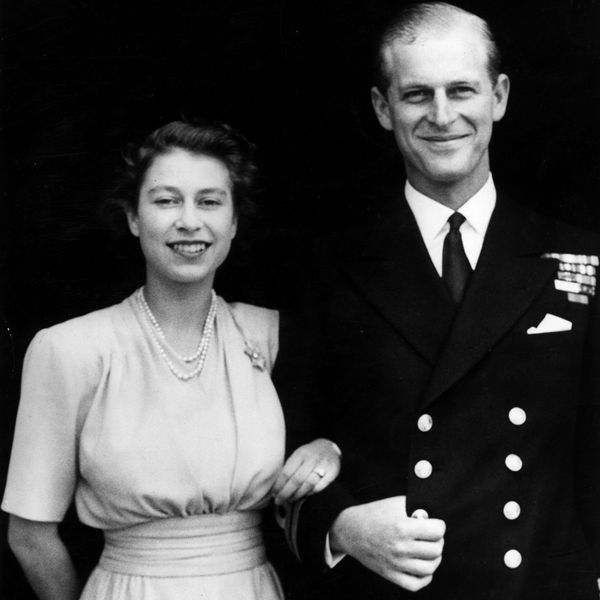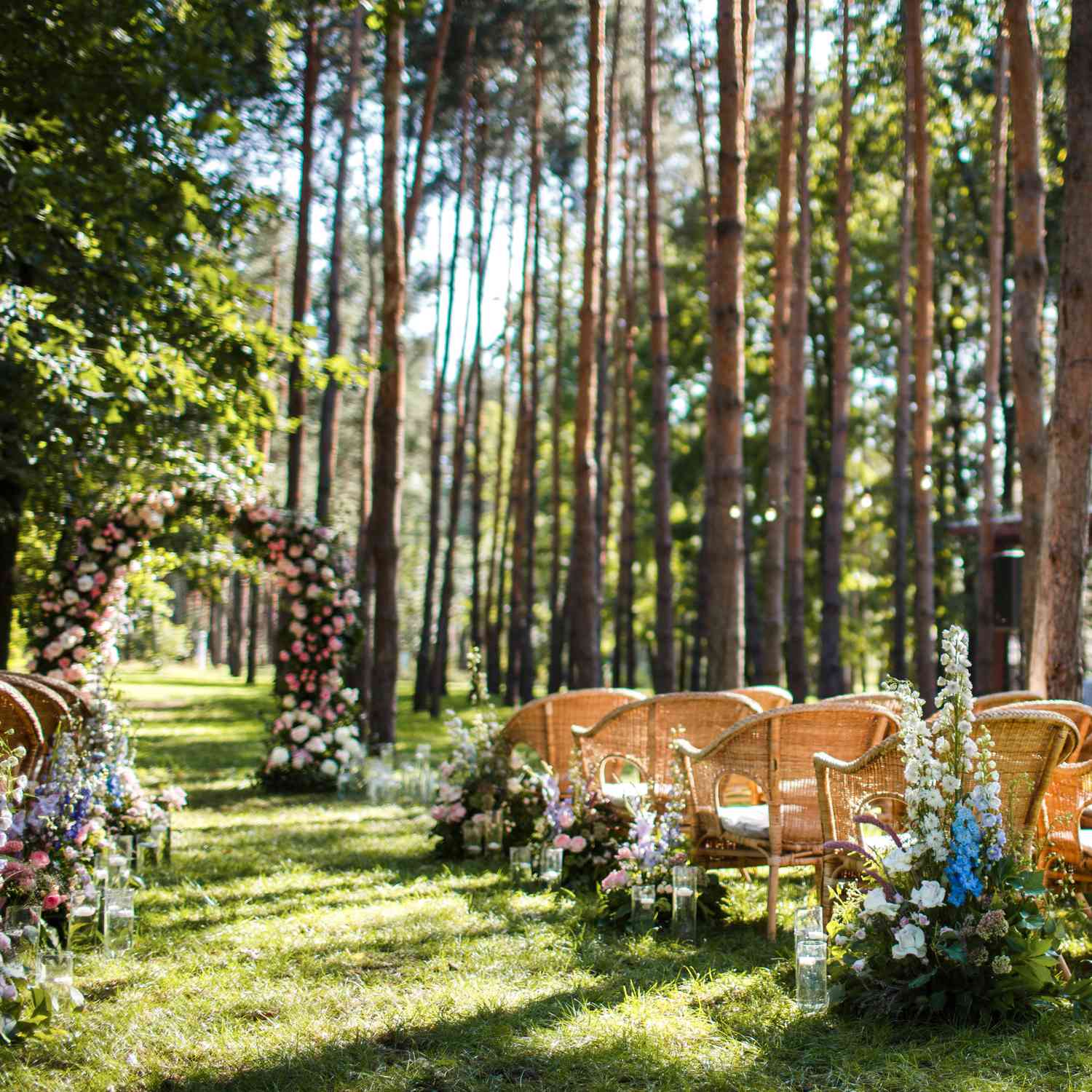
Getty Images / Victor Dyomin
Just when you thought summer in the United States couldn’t get hotter—summer 2023 was Earth’s toastiest since global records began in the 1800s, per NASA—a new report from the National Weather Service suggests that 2024’s warm-weather season is, unfortunately, going to be worse. According to The Washington Post, the outlook is predicting fiery temperatures country-wide, barring a small section of the northern Plains. Things are looking particularly hot in Texas up through the Pacific Northwest—and the Northeast is expected to feel the burn, as well. Summer also overlaps with wedding season, which means that couples tying the knot just about anywhere in the continental U.S. will have to form heat plans, in addition to rain plans, this summer.
The reason for the hotter-than-ever forecast? The likely switch from the El Niño to La Niña climate pattern by the end of summer (and of course, climate change). While this shift typically results in global cooling, La Niña summers have been historically hot in the United States due to a phenomenon known as “heat domes;” these form when high pressure atmospheric conditions remain stationary for extended periods of time (they usually accumulate over the middle of North America, per DTN, a wedding forecasting company).
While this heat forecast is just that—a prediction—National Weather Service officials and the Centers for Disease Control and Prevention (CDC) are already advising citizens across the country to prepare. “It’s giving us knowledge we can use to take steps to protect our health if we need to,” Aaron Bernstein, the director of the CDC’s National Center for Environmental Health, told The Washington Post. “We’ll be able to know how hot is too hot for health.”
Meet the Expert
- Darryl Moore is the creative director and lead planner at D'Concierge, a premier wedding and event design firm based in Houston, Texas.
- Kelly McWilliams, the founder of her eponymous wedding planning business in southwest Florida, has been in the industry since 2002.
- Michelle Norwood is based in her home city of New Orleans, but she executes events, centered around world-class hospitality, all over the globe; she has been planning weddings for over 20 years.
- Beth Helmstetter owns Beth Helmstetter Events, a full-service event design and planning firm specializing in multi-day destination weddings (especially those in tropical locales).
But what happens when “too hot for health” impacts or disrupts your wedding plans? Sure, you’ve prepared for that strong late-afternoon sun by stocking up on handheld fans for each guest and putting a deposit down on a tent, but it’s possible that summer 2024’s heat conditions will render these standard contingencies ineffective—and you might start to wonder if an outdoor event is even an option (especially if you have elderly guests, like grandparents, who are more susceptible to the effects of high-heat conditions attending). There are, however, a few things you can do now to prepare for a scorcher later. To help you get ready for the hottest wedding season in history, we tapped several wedding planners who operate in hotter-than-usual locales, from Texas and the Caribbean to Florida.
Ahead, they share the considerations you need to make now, the extras you might have to bake (pun intended) into your budget down the road, and all the little things you can do to ensure you, your wedding party, your guests, and your vendors remain safe and comfortable at the time of your summer celebration.
Key Takeaways
- According to a new outlook from the National Weather Service, summer 2024 is expected to be one of the hottest on record.
- Almost every region of the United States will experience higher-than-normal temperatures during the months of June, July, and August.
- Officials at the Centers for Disease Control and Prevention are advising people to prepare now—and that absolutely applies to anyone planning a summer wedding.
- Several wedding planners who execute events in the country and world's hottest zones say that forming a heat plan now is imperative for guest safety and minimal stress on the big day.
Communicate With Your Wedding Planner (and Other Key Vendors) Now
You can’t control your wedding day weather or temperature—but you can get ahead of it. That involves a preliminary conversation with your wedding planner, if you have one, or other key big-day players, like your venue manager, caterer (when temperatures soar, food safety becomes that much more paramount, and recent news reports of mass wedding food poisoning disasters are a testament to this), florist, and makeup artists and hairstylists, if you’re navigating this process on your own. Work with these team leads to “divide and conquer,” says Kelly McWilliams, a wedding planner and event designer based in Florida. “Get everyone informed."
Talk through the decisions you have already made—do they still hold up in the face of extreme heat? Consider the tent type you have a deposit on, for example. “You can’t get a clear tent for any weather over 70 degrees Fahrenheit. They have a greenhouse effect,” notes McWilliams. “Go with a sailcloth or white roof. Request the tallest legs possible to let heat travel higher inside the tent and allow the most breezeway.”
Similar conversations should unfold with other vendors. Perhaps you talk to your caterer now about bringing all food indoors; work with your florist to source heat-resistant blooms that won’t wilt after an hour under the hot sun; or book an extra hair trial to test out a switch from all-down Hollywood waves to a summer-friendly updo. You also might want to reconsider your bridesmaids’ attire, if that is still a potentiality; a knee-length, spaghetti strap option (in a breathable fabric, like cotton or linen) will feel and look better than a silk floor-length gown that overheats and shows every sweat mark.
Make a Heat Plan
“Just as with rain plans, couples should definitely have a heat plan, especially in the summer. A heat plan involves arranging for ample shaded areas, cooling stations, and perhaps a backup indoor venue if the heat becomes unbearable,” says Darryl Moore, a wedding planner who is based in Houston, Texas. “It’s advisable to discuss these options early in the planning process and have everything detailed in the event timeline. I would professionally advise clients to avoid having any outside functions in summer months known for heavy heat advisories.”
Since heat advisories might come into play everywhere this summer, a contingency plan is mandatory. These plans won’t just help you prepare for that heat—they’ll also set the threshold for when changes need to be made, which will take the emotion out of it in the days before the wedding. You’ll decide now, for example, that if the temperature hits 90 degrees, you’re moving inside (period!) instead of going back and forth during what is arguably already a stressful time. “Having a heat plan in place will predetermine the day and time you’ll switch to plan B,” affirms McWilliams, noting that this plan might involve a shift in event timing, a change in where each component takes places (perhaps only the ceremony happens outside), or, in incredibly rare cases, a cancellation. “Some venues even have strict guidelines for when plan B needs to go into effect.”
According to McWilliams, the best wedding heat plans have two parts: one that centers around logistics (make sure you have quotes pulled and plans in place for every item) and another that focuses on guest wellness (order these necessities ahead of time to ensure everyone remains comfortable).
Logistics
- Tents (to cover catering, band/DJ, and guests)
- Market umbrellas
- Electric fans
- Misters
- A/C (outdoor units)
- Additional ice delivery
- Additional generators
Guest Experience
- Extra shirts for the men in the wedding party
- Hand fans and parasols
- Water stations at all sites during the welcome, ceremony, cocktail hour, and reception
- Double ice in all water glasses
- Rolled-up washcloths (frozen)
- Transportation plans for vulnerable guests
Be Prepared to Use Your Emergency Fund
Unfortunately, heat plans and extra weather-related contingencies aren’t cheap. “Especially if you are air conditioning a tent, that is a big ticket expense line item,” says wedding planner Michelle Norwood, who is based in New Orleans. “Small things add up quickly, as well as misters, hand fans, parasols, etc.” Also think about vendors who might need to stay longer or provide additional services in order to keep you and your spouse photo-ready. “The day rate for a makeup artist might need to be added to the line-item designated for heat plans,” notes Norwood.
All to say, you should be prepared to use that emergency fund you’ve set aside in your budget. “Your wedding spending plan should include a line item for contingencies that is equal to 10 to 15 percent of your budget,” McWilliams explains. “If you don’t use it, add it to your honeymoon! This way, you aren’t stressing out about necessary expenses that you don’t have money for.”
Monitor Temperatures the Week Before Your Wedding
Yes, there are things you can and should do now in light of the National Weather Service’s summer 2024 outlook—but you won’t know what temperatures you’re dealing with until the week of your wedding. In Florida, McWilliams prefers to activate heat plans six to seven days in advance, when she has a better sense of the forecast. “This allows us to prepare and confirm rentals of things like electric fans, hand fans, parasols, iced wet washcloths, and market umbrellas,” she says.
Moore does the same and has clear, candid conversations with his clients if and when adjustments are necessary. “We might adjust the timing of the ceremony to cooler parts of the day, provide additional shade through tents, and ensure we have fun and necessary hydration stations are available and easily accessible,” he adds. He also communicates any trepidation about seasonality or event format from the jump, at the time of booking—so if your wedding planner or another key vendor is telling you that an entirely outdoor event in Houston in the middle of July is a bad idea, you should probably listen. “If you booked the date against the advice of all the professionals, that's your date,” says Norwood. “Keep that in mind when deciding to move forward. It will be hot.”
If you decide to make any changes to your big-day format, make sure to share all need-to-know information with your guests in a timely manner via your wedding website. "Communicate potential changes to guests in advance so everyone comes prepared," says wedding planner Beth Helmstetter, who regularly plans events in tropical parts of the world. Even if you stay the course, attendees need to know what to expect, especially in the case of summer heat: "It’s golden to mention on the wedding website that the ceremony will take place outside, so they can dress properly or make the call either to accept or decline the invitation."
Safety First: Bring Your Wedding Indoors If You Need To
There are a slew of shifts and scheduling changes that you can make on your wedding day if it’s just too hot to get married outside, and not all of them require bringing the entirety of your event indoors. “Sometimes you can move just one or two parts of your wedding day when the heat is highest,” says McWilliams. “For example, your ceremony likely has the shortest time frame. Consider maybe keeping that outside and moving the cocktail and reception indoors.”
Of course, you need to be able to have these options to implement them, which is why communicating with your vendors and venue and forming that heat plan now is essential. “Given the unpredictability of weather, it’s wise for couples to discuss indoor alternatives or shaded venues with their vendors well ahead of time,” notes Helmstetter. “Having a plan that easily transitions from outdoor to indoor can alleviate last-minute stress.”
Yes, these preparations are about minimizing the amount of decisions you have to make (and the stress that you might feel) when the big day arrives, but ultimately, they center safety ahead of everything else. “It’s important to be flexible and pivot, especially for guests who are most susceptible to adverse effects,” says McWilliams. “Make decisions to keep those specific guests indoors until absolutely necessary.”
Those decisions might include having indoor stations set up, no matter the weather, for anyone who needs them or arranging special transportation for elderly or medically compromised attendees who might not be able to travel with the larger group. And if you just can’t deal with the what ifs? There’s nothing wrong with pivoting now—trust us, we know how beautiful indoor events are—for peace of mind. “If you are having second thoughts about the heat, adjust to plan B and bring your event indoors,” says Norwood.
